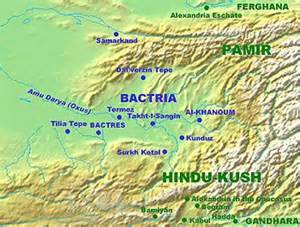I wrote here that "great events of world historical importance occur outside Bactra" but do they? In the Time Patrol series, we get used to reading about critical eras and unstable space-time zones but Shalten later tells Everard that Bactria in 209 BC was unusually stable:
"'Greek Bactria was as safe a piece of history as we could find to lure the Exaltationists to. It had never much mattered to the rest of the world, and an extraordinary concatenation of fantastically implausible occurrences, not just there but around the entire Hellenistic sphere, would have been required to change this. Therefore, by the law of action and reaction, its own mesh of world lines is especially stable, especially hard to distort. Of course, we were at pains to give the Exaltationists the opposite impression.'"
-Poul Anderson, The Shield Of Time (New York, 1991), p. 121.
But surely nevertheless if the Exaltationists had successfully helped Antiochus to kill Euthydemus, then there would have been ripples and repercussions? Shalten had previously outlined an alternative timeline to Everard:
Antiochus conquers Bactria early in his campaign;
this frees him also to conquer in western India;
these conquests strengthen him against Egypt and Rome;
he retains his gains and helps Carthage to survive the Third Punic War;
his descendant succeeds in crushing Judaism;
no Christianity;
a different history, possibly guarded by an alternative Time Patrol.
This scenario had enough plausibility for Shalten to sell it to the experienced Everard! So I am not sure what the truth is about the might-have-beens.

1 comment:
Kaor, Paul!
The trap set by the Time Patrol in Bactria might have failed, and the Exaltationists could indeed have changed history in the ways you listed. It's seems to me the Patrol was still taking a RISK.
Sean
Post a Comment